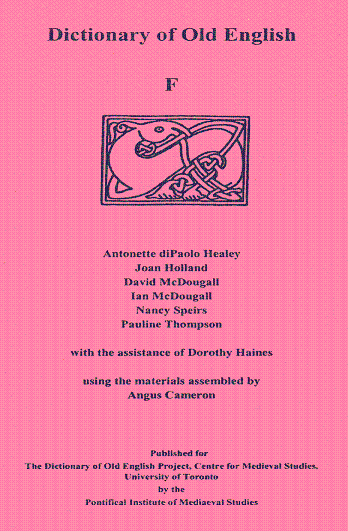2004 – 35 fiche. ISBN 0-88844-929-1 $49.50
Order from the Pontifical Institute of Mediaeval Studies (PIMS)
This seventh fascicle of the Dictionary of Old English, the letter F, consists of 3,014 headwords in 7,459 pages, on microfiche. The material on which F is based represents a fresh look at all surviving Old English (except some multiple copies of texts), an estimated four million running words.
The first electronic version of the Dictionary of Old English: A to F on CD-ROM was published in July 2003. This present publication of F on microfiche, a year later, is intended for those scholars who, for various reasons, are not able to use the electronic DOE. Although microfiche publication presents a static dictionary rather than a dynamic text, at the very least it allows the dissemination of new research to colleagues and students engaged in the study of Old English, sometimes under incredibly challenging circumstances.
The introductory fiches present an updated bibliography of the texts which comprise the Dictionary of Old English Corpus, alphabetized by Short Title, together with their system of reference. This bibliography supercedes all previous bibliographies issued by the project.
Unlike the previous letters of the Dictionary of Old English published on microfiche, this is our first microfiche publication of the DOE to go directly from electronic files to microfiche without the production of a paper copy for the microform company as an intermediary stage. As all checking was done interactively at terminals, there was an enormous saving of time over previous microfiche publications. We hope to have caught as many errors as possible, but we would be grateful to receive notice of any remaining errors or anomalies. Please write to corpus@doe.utoronto.ca.
The Dictionary of Old English provides an inventory and description of the English language from its earliest appearance in written records, ca. 600. It is intended to complement the Oxford English Dictionary for the earliest period of the language; indeed, the Dictionary of Old English will catalogue the Old English vocabulary deliberately excluded from the OED because it failed to survive past 1150.
The Dictionary draws on as wide a range of texts — in date, dialect and genre — as possible. It differs from previous dictionaries in several important features: a listing in a simplified paradigmatic order of every spelling which is attested for a word in the Electronic Corpus; frequency counts for each word in the Corpus so that readers can know what proportion of the evidence has been cited; usage labels where they are statistically significant, noting restrictions to a class of texts, to an author, or to a particular period or dialect; exhaustive citation for all words of twelve or fewer occurrences.
Fascicle F was prepared by Antonette diPaolo Healey, Joan Holland, David McDougall, Ian McDougall, Nancy Speirs, and Pauline Thompson, with the assistance of Dorothy Haines, using materials assembled by the late Angus Cameron. Michiko Ogura of Chiba University contributed the entries on (ge)faran and (ge)fēran, Hiizu Moriyama of Waseda University did preliminary work on the feorm word-family, and Ishiguro Taro of Kyorin University wrote a preliminary draft of forsacan.
